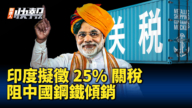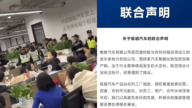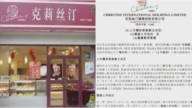【新唐人2013年11月25日讯】中共央行连续开展逆回购操作,净投放规模达到590亿元。业内人士认为,扩大实施逆回购规模有利于平抑眼前资金波动,防止市场恐慌情绪的发生和蔓延。不过专家指出,中国金融危机正在逼近,在当今通货膨胀高涨的情况下,继续放水,会导致通货膨胀继续上升,民怨沸腾,是死路一条。
11月19号,中共央行已经净投放350亿元,21号,央行再次重启14天期逆回购操作,投放资金330亿元,由于上周到期逆回购回笼资金90亿元。等于上周三天内,央行通过公开市场操作,向市场投放了590亿元资金。
上周, 银行间市场呈现资金价格也呈现出快速上升趋势。以7天质押式回购为例,利率从周二的3.5989%,连续升值到周五的5.4470%高位。
同样呈现紧张的还有债市的资金面,进入今年10月以来,10年期国债收益率一反常态迅速攀升,11月18号,10年国债中债参考估值为4.6619%,已经创出了2005年3月以来的新高。 20号,收益率攀升至4.7%,再次创出新高。
大陆金融投资顾问郑先生:“银行缺钱,市场缺钱,实体经济,民营企业那边都缺钱,市场面这么紧绷,政府说要制造一个繁荣的预期和景象,然后吸引外资和民间的资本。”
“兴业银行”首席经济学家鲁政委向大陆《财经网》记者表示,迈向持续复苏的反转仍未到来。
11月9号,中共国家统计局公布10月份经济数据,消费者物价指数(CPI)再破警戒线创8个月新高,其中鲜菜价格大涨31.5%,通货膨胀严重。
美国南卡罗莱纳大学艾肯商学院教授谢田:“对银行来说,资金断缺和坏账上升,银行破产的危险性,越来越大了,没有其他办法,只能继续放水,可以预计通货膨胀会加快的进一步增长。通货膨胀这么严重,它再放水的话,实际是一种自杀的行为。”
目前,人民币对美元实行单边升值,据统计,在过去8年时间,人民币对美元中间价累计升值了34%,人民币名义和实际有效汇率,累计升值29%和38%。
研究表明,人民币每升值1%,棉纺织、毛纺织、服装行业的利润率将下降3.19%、2.27%和6.18%。人民币升值对出口企业签约和利润都造成较大的负面影响。人民币短期快速升值甚至导致“有单不敢接”现象严重,出口利润进一步被压缩,中小企业出口受到严重冲击。
大陆经济学者金融投资顾问郑志遥向《新唐人》表示,由于过去几年,政府管的太多,导致经济与货币的风险正在逐步发酵。
郑先生:“我们从股市可以看得出来,股市是一个国家实体经济的晴雨表,我们的股市里面,你没看到吗,全是靠题材股,和消息、和政策,过剩产能很严重,钢铁是越亏损越生产,越生产越亏损,不生产怎么办,立刻破产,到时候造成的恶果,就是银行企业很多的问题要出现。”
17号,中共央行研究局首席研究员邹平座指称,中国金融结构不断恶化,有三重危机正逼近中国。不过邹平座表示,中国的可能性金融风险并不表现于总量方面,最大的风险潜伏于结构与体制之中。
郑先生:“现在我们的经济泡沫、房地产的泡沫、潜存的经济危机步步来临。而腐败已经影响到这个根基了,同时还有环境污染,呼吸的空气,你吃的水,你的土壤都被恶化了。怎么办啊!已经被逼到绝路上去了。”
11月20号,中共中央财经领导小组办公室巡视员方星海,出席“财经年会2014”时,提出当前金融市场的四大风险,可能导致一些中小银行和金融机构破产。这四大金融风险表现为,流动性的风险,利率风险,资产质量风险,以及信托理财、委托贷款和影子银行的产品带来的风险,都会回到银行中来,最终可能导致中小银行倒闭。
采访编辑/刘惠 后制/萧宇
China’s Central Bank Faces Financial Crisis
China’s Central Bank is trying to carry out reverse repo
operations, and net investment reaches 59 billion yuan.
Financial professionals believe large scale reverse repurchase
helps to stabilize fluctuations in the market and prevent panic
from spreading within the market.
However, experts point out that China’s financial crisis is
approaching.
By pouring in more money during rising inflation it will
lead to higher inflation and more complaints from people.
On Nov. 19, the Central Bank has put in 35 billion yuan, and
two days later, restarted two weeks of reverse repo operations, investing another 33 billion yuan.
Last week, it spent 9 billion in repo operations.
Altogether, the Central Bank has added 59 billion to the
market in three days.
Last week, the inter-bank money market showed a rapid rise.
For example, with seven days pledged repo, the interest rate
of 3.5989% on Tuesday rose to 5.4470% on Friday.
Meanwhile, tight bond funds also appeared from the start
of October this year.
10-year bond yields climbed rapidly to
4.6629%, a new high since March 2005.
On Nov.20, they climbed to 4.7%, another new high.
Mr. Zhheng, a financial consultant: “Banks, money markets,
and private enterprises are all short of money.
But our government wants to create a scene of prosperity to
attract foreign investment and capital from private sectors."
Lu Zhengwei, chief economist from X. Y. Bank told a
Financial Network reporter that reversing towards a sustained
recovery is not yet here.
On Nov. 9, the National Bureau of Statistics announced that
according to the economic data of October, the CPI (consumer
price index) broke a warning line, hitting a 8-month high, and
fresh vegetables rose by 31.5%, indicating a serious inflation.
Xie Tian, professor, university of South Carolina Aiken
School of Business: “For banks, lack of funds and rising
bad debt increase likelihood of bankruptcy.
The government has no other option but to add more money.
It can be expected to see inflation accelerate further.
If it continues to add money under severe inflation,
it will be a suicidal act."
Currently, the appreciation of RMB against the U.S. dollar
is only unilateral.
According to statistics, in the past eight years, central parity
of RMB against the U.S. dollar has appreciated by 34%.
RMB, in nominal and effective exchange rate, has appreciated
29% and 38%.
Research shows that every 1% appreciation of RMB causes
profit margins to decline 3.19%, 2.27% and 6.18% in cotton,
wool textiles and apparel industry respectively.
RBM appreciation causes greater negative impact on exports
and corporate profits.
Short-term rapid appreciation of RMB leads to fear of taking
contracts and results in further shrinkage of profit margins.
Small and medium enterprises are seriously
impacted by it.
Chinese economist and investment consultant
Zheng Zhiyao told NTD that the Chinese government
has intervened too much in the past several years,
causing economic and monetary risks to gradually intensify.
Mr. Zheng: “The stock market is like a barometer,
and from it we can see a country’s real economy.
In our [China’s] stock market, can’t you see,
it all relies on China concepts stocks, news and policies.
The excess capacity is very severe.
The greater the iron and steel deficit,
the more they produce.
The more they produce, the greater the deficit.
What happen if they don’t produce? It will bankrupt.
As a result, many problems have appeared in banking sectors."
On Nov. 17, Zou Pingzuo, chief researcher at People’s
Bank of China, says China’s financial structure
is constantly worsening, and a triple crisis is approaching.
He says that the possibility of financial risk is not
reflected in the overall volume.
The biggest crisis is hidden in the structure and the system.
Mr. Zheng: “Our economic bubble, real estate bubble and
hidden economic crisis are just around next corner.
Meanwhile, corruption has affected the foundation.
On top of it, environmental pollution of the air, water and soil
are all worsening.
What can we do?! We’ve been forced into a dead end."
On Nov. 20, Fang Xinghai, inspector for
the Leading Group for Financial and Economic Affairs
attended the 2014 Caijing Annual Conference.
Fang said that the current four major risks in the
financial market will likely cause bankruptcy to medium and
small sized banks and financial institutions.
The four crises manifested in a liquidity risk, interest rate risk,
asset quality risk and risks brought by trust management,
entrusted loans and products from shadow banks.
All such risks fall upon banks, and may trigger
small and medium banks to go bankrupt in the end.
Interview & Edit/LiuHui Post-Production/XiaoYu




























